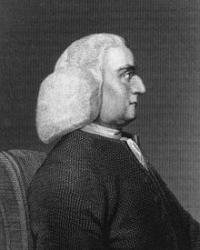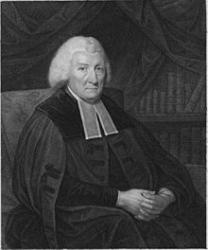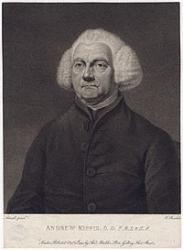Planning worship?
Check out our sister site, ZeteoSearch.org,
for 20+ additional resources related to your search.
- |
User Links
Person Results
‹ Return to hymnal




Export as CSV
George Buist
Editor of "" in A Collection of Hymns for Public and Private Worship approved by the Presbytery of Charleston
George Buist
Thomas Blacklock

1721 - 1791 Hymnal Number: d85 Author of "In life's gay dawn [morn] when [blooming] sprightly youth" in A Collection of Hymns for Public and Private Worship approved by the Presbytery of Charleston Blacklock, Thomas, D.D., born at Annan, Dumfriesshire, November 10, 1721. He studied at the University of Edinburgh, and was, in 1759, licensed to preach. In 1762 he was ordained pariah minister of Kirkcudbright, but, on account of his blindness, had to resign and retire on an annuity. He went to Edinburgh and there received as boarders University students and boys attending school. In 1767 he received the degree of D.D. from the University of Aberdeen (Marischal College). He was one of the earliest and most helpful literary friends of Robert Burns. He died at Edinburgh July 7, 1791. His Poems were often printed—in 1756 at London, with a Memoir by the Rev. Joseph Spence, Professor of Poetry at Oxford; in 1793, at Edinburgh, with a Memoir by Henry Mackenzie, &c. They include 2 Psalm Versions, and 4 Hymns. "Hail, source of pleasures ever new," is altered from the Hymn to Benevolence, and "Father of all, omniscient mind," is from his version of Psalm 139. No. 16 in the Translations and Paraphrases of 1781, “In life's gay morn," &c, is also ascribed to him. [Rev. James Mearns, M.A.]
-- John Julian, Dictionary of Hymnology (1907)
Thomas Blacklock
Daniel Turner
1710 - 1798 Hymnal Number: d182 Author of "With thee, great God, the stores of light" in A Collection of Hymns for Public and Private Worship approved by the Presbytery of Charleston Turner, Daniel, M.A., was born at Blackwater Park, near St. Albans, March 1, 1710. Having received a good classical education, he for some years kept a boarding-school at Hemel Hempstead, but in 1741 he became pastor of the Baptist church, Reading. Thence he removed, in 1748, to Abingdon, and continued pastor of the Baptist church there until his death on Sept. 5, 1798. He was much respected throughout his denomination, and was the friend and correspondent of Robert Robinson, Dr. Rippon, and other eminent men of that day. He probably received the honorary degree of M.A. from the Baptist College, Providence, Rhode Island. Turner was the author of works on Open Communion and Social Religion; also of Short Meditations on Select Portions of Scripture. His Divine Songs, Hymns and other Poems were published in 1747, and his work, Poems Devotional and Moral, was printed for private circulation in 1794. Four of his hymns are in the Bristol Baptist Collection of Ash & Evans (1769), and eight (including the four already named) in Rippon's Baptist Selection 1787). Only the following are now in common use:—
1. Faith adds new charms to earthly bliss (1769). Excellence of Faith.
2. Jesus, full of all compassion (1769). Sinner's appeal to Christ.
3. Lord of hosts, how lovely fair (1787). Divine Worship. Altered in Baptist Psalms and Hymns, 1858, to “Lord of hosts, how bright, how fair!"
The well-known hymn "Beyond the glittering starry skies," in its enlarged form of 28 stanzas, was the joint production of Turner and his brother-in-law, the Rev. J. Fanch. [Rev. W. R. Stevenson, M.A.]
-- John Julian, Dictionary of Hymnology (1907)
Daniel Turner
John Patrick
1632 - 1695 Hymnal Number: d116 Author of "O God, we praise thee and confess" in A Collection of Hymns for Public and Private Worship approved by the Presbytery of Charleston John Patrick, a brother of Bishop Simon Patrick, was Prebendary of Peterborough, 1685; Precentor of Chichester, 1690; and preacher at the Charter-House, in the Chapel of which he was buried on his death, in 1695. His "Psalms of David, in Metre," were much used by Presbyterians and Independents until superseded by the compositions of Watts.
----Annotations of the Hymnal, Charles Hutchins, M.A. 1872.
John Patrick
Nathaniel Cotton

1707 - 1788 Hymnal Number: d83 Author of "If solid happiness we prize, Within our breast" in A Collection of Hymns for Public and Private Worship approved by the Presbytery of Charleston Cotton, Nathaniel, M.D., born in 1707, and educated for the medical profession at Leyden. Giving his attention more especially to brain diseases, he first assisted a physician, who devoted his attention to the insane, at Dunstable; and they erected a large Asylum at St. Albans. In 1763 the poet Cowper became one of his patients, and, on his recovery, conceived a warm attachment for his medical friend. Dr. Cotton died at St Albans, Aug. 2, 1788. Several of his hymns appeared from 1760 onwards in Dr. Dodd's Christian's Magazine, some signed "Dr. Cotton, St. Albans," some “N.," and some without signature. His poetical works were published posthumously:— Various Pieces in Verse and Prose, 2 vols., Lond., Dodsley, 1791; and Visions in Verse, &c, with Memoir, 1808. His hymns came into use through Collyer's Collection, 1812.
They are:—
1. Amid the various scenes of ill. Affliction Sanctified. From Various Pieces, &c, 1791.
2. Tell me, my soul, O tell me why. Sin the cause of fear. From Various Pieces, &c, 1791.
3. This is the day the Lord of Life. Sunday. From Various Pieces, &c, 1791.
4. While sorrow wrings my bleeding heart. Suffering. From his version of Ps. xiii., "Offended Majesty, how long ?" in the Christian's Magazine, Feb. 1761.
5. With fierce desire the hunted hart. Ps. 42.
Dr. Cotton's most widely known hymn is, “Affliction is a stormy deep," q. v. It is a port of No. 5.
--John Julian, Dictionary of Hymnology (1907)
Nathaniel Cotton
Hugh Blair

1718 - 1800 Hymnal Number: d33 Author of "Come unto me, all ye who groan" in A Collection of Hymns for Public and Private Worship approved by the Presbytery of Charleston Blair, Hugh, D.D., eldest son of John Blair, merchant. Edinburgh, was born at Edinburgh, April 7, 1718. In 1730 he entered the University of Edinburgh, where he graduated M.A. in 1739. In 1742 he was ordained parish minister of Collessie, in Fife, became, in 1743, second minister of the Canongate, Edinburgh, in 1754 minister of Lady Yester's, and in 1758 joint minister of the High Church (now styled St. Giles's Cathedral). In 1762, while still retaining his pastoral charge, he was appointed the first Professor of Rhetoric in the University of Edinburgh—a chair founded for him. He received the degree of D.D. from the University of St. Andrews, in 1757. He died in Edinburgh, Dec. 27, 1800.
In 1744 Dr. Blair was appointed a member of the Committee of Assembly which compiled the Translations and Paraphrases of 1745, and in 1775 of that which revised and enlarged them. To him are ascribed by the Rev. W. Thomson and the Rev. Dr. Hew Scott, Nos. 4, 33, 34, 44, of the 1781 collection. He is also credited with the alterations made on Paraphrases 32 and 57, in 1745-51, and on Paraphrase 20, in 1781. The Rev. J. W. Macmeeken would ascribe these 4 Paraphrases to his second cousin, the Rev. Robert Blair, author of The Grave [eldest son of the Rev. David Blair, born in Edinburgh, 1699, ordained Parish minister of Athelstaneford, East Lothian, in 1731,appointed, in 1742,a number of the Committee which compiled the 1745 collection, died at Atholstaneford. Feb. 4, 1746]. Dr. C. Rogers, in his Lyra Britannica (pp. 66 & 664, ed. 1867) holds that, though Dr. Hugh Blair may have altered Paraphrases 44 and 57, neither he, nor Robert Blair, wrote any original hymns. While the weight of opinion and of probability is in favour of Dr. Hugh Blair, no very definite evidence is presented on either side, though the records of the Presbytery of Edinburgh in 1748 show Dr. Hugh Blair as selected to revise Nos. 18 (7 in 1781), 21 (46 in 1781), and probably others. [Rev. James Mears, M.A.]
-- John Julian, Dictionary of Hymnology (1907)
Hugh Blair
Simon Browne
1680 - 1732 Hymnal Number: d30 Author of "Come, gracious Spirit, heavenly Dove" in A Collection of Hymns for Public and Private Worship approved by the Presbytery of Charleston Simon Browne was born at Shepton Mallet, Somersetshire, about 1680. He began to preach as an "Independent" before he was twenty years of age, and was soon after settled at Portsmouth. In 1716, he became pastor in London. In 1723, he met with some misfortunes, which preyed upon his mind, and produced that singular case of monomania, recorded in the text-books of Mental Philosophy; he thought that God had "annihilated in him the thinking substance, and utterly divested him of consciousness." "Notwithstanding," says Toplady, "instead of having no soul, he wrote, reasoned, and prayed as if he had two." He died in 1732. His publications number twenty-three, of which some are still in repute.
--Annotations of the Hymnal, Charles Hutchins, M.A., 1872.
==================
Browne, Simon. A contemporary of Dr. Watts, born at Shepton Mallet, Somersetshire, cir. 1680, and died in 1732. After studying for the Independent Ministry under the Rev. John Moore, of Bridgewater, he became pastor of an Independent charge in Portsmouth, and then, in 1716, of the Independent-Chapel in Old Jewry, London. His lateryears were clouded by a peculiar malady, under the influence of which "he imagined that God had in a gradual manner annihilated in him the thinking substance, and utterly divested him of consciousness." It is supposed that the death of a highwayman at his hands during a violent struggle, followed by that of his wife and son a short time after, had much to do in producing this sad result. Whilst thus contending that he had no power to think, he produced a work in defence of Christianity, another in defence of the Trinity, a third as an Exposition of the 1st Epistle to the Corinthians, and a fourth in the form of a Dictionary. His publications number over 20. Of these works, he is known to hymnology through his:—
Hymns and Spiritual Songs, in Three Books, designed as a Supplement to Dr. Watts, &c, 1720, 2nd edition 1741, 3rd edition 1760. It contains 166 hymns, 7 doxologies, and a Preface of some historical interest.
In the old collections Simon Browne's hymns (all of which are from the above collection) held a prominent position, but in modern hymnals they are fast passing out of use. The best known and most widely used are "Come, Holy [gracious] Spirit, Heavenly Dove," "O God, on Thee we all depend," and "Lord, at Thy feet we sinners lie." In addition the following are also in common use:—
1. Eternal God, Almighty Cause. Unity of God.
2. Eternal God, of beings First. God all in all .
3. Frequent the day of God returns. Sunday.
4. Great First of beings, Mighty Lord. Creation.
5. Great God, my joyful thanks to Thee. Thanksgiving.
6. Great God, Thy peerless excellence. Imitation of God.
7. Great Lord of earth and seas and skies. Providence.
8. Great Ruler of the earth and sky. Providence.
9. Hail, Holy Spirit, bright, immortal, Dove. Whitsuntide.
10. Hail, happy day, the [thou] day of holy rest. Sunday.
11. I cannot shun the stroke of death. Death.
12. Lord, Thou art good; all nature shows. Divine Goodness.
13. Lord, what a feeble frame is ours. Frailty of Life.
14. O God, on Thee we all depend. Confidence in God.
-- John Julian, Dictionary of Hymnology (1907)
Simon Browne
Michael Bruce
1746 - 1767 Hymnal Number: d4 Author of "All nature dies, and lives again" in A Collection of Hymns for Public and Private Worship approved by the Presbytery of Charleston Bruce, Michael, son of a Scottish weaver, was born at Kinnesswood, Portmoak, Kinrossshire, Scotland, March 27,1746, and educated at the village school, Edinburgh University (where he first became acquainted with John Logan), and the Theological Hall of the Associate Synod, held at Kinross, under the Rev. John Swanston, intending ultimately to enter the ministry, a hope which was frustrated by his untimely death. To assist in procuring University fees and maintenance he for some time conducted a school, during the recess, at Gairney Bridge, and subsequently at Forrest Mill, near Tillicoultry. Whilst yet a student he died at Kinnesswood, July 5th, 1767.
[Also, see Logan, John]
The names of Michael Bruce and John Logan are brought together because of the painful controversy which has long prevailed concerning the authorship of certain Hymns and Paraphrases of Holy Scripture which are in extensive use in the Christian Church both at home and abroad. During the latter years of Bruce's short life he wrote various Poems, and also Hymns for a singing class at Kinnesswood, which were well known to his family and neighbours, and were eventually copied out by Bruce himself in a quarto MS. book, with the hope that some day he might see them in print. Immediately upon his death, in 1767, Logan called upon his father and requested the loan of this book that he might publish the contents for the benefit of the family. This was granted. Not till three years afterwards did a certain work, containing seventeen poems, and entitled Poems on Several Occasions , by Michael Bruce, 1770, appear, with a Preface in which it was stated that some of the Poems were by others than Bruce.
-- John Julian, Dictionary of Hymnology (1907)
Michael Bruce
Thomas Randall
1711 - 1780 Hymnal Number: d104 Author of "Love suffers long, love envies not" in A Collection of Hymns for Public and Private Worship approved by the Presbytery of Charleston Randall, Thomas, M.A., was born in 1711, and studied at the University of Edinburgh, where he graduated M.A. in 1730. In 1739 he became parish minister of Inchture, Perthshire, and in 1770 minister of the East Church, Stirling. He died at Stirling, July 21, 1780. He was one of those added in 1714 to the Committee of the General Assembly of the Church of Scotland which compiled the Translations and Paraphrases of 1745. To him is ascribed No. 11 in the collection of 1745, No. 49 in that of 1781. [Rev. James Mearns, M.A.]
--John Julian, Dictionary of Hymnology (1907)
Thomas Randall
Andrew Kippis

1725 - 1795 Hymnal Number: d125 Author of "Say, should we search the globe around" in A Collection of Hymns for Public and Private Worship approved by the Presbytery of Charleston Kippis, Andrew, D.D., was born at Nottingham, March 28,1725, and educated for the ministry under Dr. Doddridge at Northampton, 1741-46. After a short residence with congregations at Boston and Dorking, he settled in London in 1753, as minister of the Princes Street Chapel, Westminster. There lie remained till his death in 1795, holding rank as the leading Presbyterian minister in the metropolis. For many years he was classical tutor at the Hoxton Academy, and afterwards at the Hackney College. He contributed largely to the Gentleman's Magazine and the Monthly Review, and edited five volumes of a new edition of the Biographia Britannica, a work commenced in 1778, and interrupted by his death on Oct. 8, 1795. His Life of Captain Cook was also published separately, and to his edition of Lardner's Works (1788) a Memoir was prefixed. His degree of D.D. was con¬ferred by the University of Edinburgh in 1767.
He was joint editor of A Collection of Hymns and Psalms for Public and Private Worship, selected and prepared by Andrew Kippis, D.D., &c. ; Abraham Rees, D.D., &c.; Rev. Thomas Jervis, and Rev. Thomas Mor¬gan, LL.D., London, 1795. This collection, commonly known as Kippis's, but sometimes as Kees's, passed through many editions, a Supplement being added in 1807, and was very generally used during the early decades of this century by congregations of Presbyterians and others, then become Unitarian in London and throughout the country [Unitarian Hymnody, § 9]. It contained 690 hymns.
The aim of the editors in their selection was to avoid “everything of a doubtful or disputable kind," and they adopt the language of Dr. Watts in the preface to his Hymns, "The contentious and distinguishing word of sects and parties are excluded." The alterations and omissions to adapt various hymns to the standard of the editors are considerable, though very little compared to what was done by others before and after them. The tone of the collection is somewhat colourless, and it gradually gave place among Unitarians to others which contained fuller and more varied expression of distinctively Christian feeling.
Two hymns by Kippis appear in this Collection.
1. Great God, in vain man's narrow view, The Incomprehensibility of God, which was generally adopted in later Unitarian books, and appears in Martineau's Hymns, 1840 and 1873.
2. How rich thy gifts, Almighty King, National Thanksgiving, which is four stanzas of the hymn, "Say, should we search the globe around," written for the thanksgiving appointed Nov. 29,1759, and appended to his Sermon on that occasion. It was given in full in Pope's Collection, 1760; and the Liverpool Octagon Collection, 1763. In Lindsey's Collection, 1774, five stanzas are given; in other early books only four, as in Kippis. The last two stanzas, somewhat altered, appear anonymously as: "With grateful hearts, with joyful tongues," in the Congregational Hymn Book, 1836, and the New Congregational Hymn Book, 1859.
[Rev. Valentine. D. David, M.A.]
--John Julian, Dictionary of Hymnology (1907)
Andrew Kippis


 My Starred Hymns
My Starred Hymns


